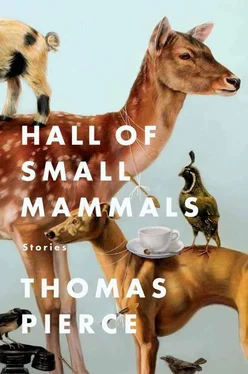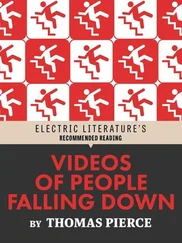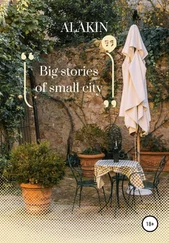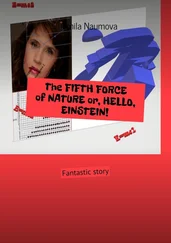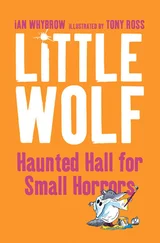“Okay, so they’re falling up,” someone else says. “I guess I get it.”
The small crowd takes turns hovering in front of the artist’s statement:
Until recently I was strictly a painter. I painted women to look like swans. If you’d asked me why I did this, I couldn’t have told you. I painted what I painted. But then an old injury made it extremely painful for me to paint anymore. Years ago I broke my arm and wrist and three ribs in a biking accident. Maybe the doctors didn’t set it right or maybe I have tendonitis now. Either way, it got me thinking about the accident. My brother had filmed it and posted it online while I was in the hospital. At the time that pissed me off but then, all these years later, I couldn’t stop watching it. I didn’t look like myself at all. I could pause it right before I hit the asphalt. I looked both calm and terrified at the same time. Like I’d given in to something. Was this me stripped of all pretense and personality? Was this the actual me? Was this me confronting the void? I showed the video to my wife and asked her what she thought.
She said my face was like Moses’ in front of the burning bush — terror and awe.
I started watching other videos. There were so many of them. Millions of people had already clicked on them — and why? Scientists have discovered something called “mirror neurons.” A mirror neuron is one that will fire in your brain when you perform an action and also when you watch that same action being performed by someone else. Why we have these neurons is a mystery. Maybe they’ve helped us become more empathetic. When you see or read about someone else’s bad news, maybe a part of you is experiencing it too. It occurred to me that when we watch videos of people falling down, we are waiting for the moment of impact — for a bruise, a hurt, a collision — and that expectation makes us full participants in the event. Every fall we see is our own, and all of us are falling all the time.
I wondered if the same would hold true if I reversed the fall. Would our neurons mirror that rising? Are all of us rising right now? Are you?
— Davy V.
“I don’t think I am. I don’t feel like I’m rising.”
“So it’s about sin, right?”
“People falling. Of course it’s impossible not to think about 9/11.”
“I think it’s about how fragile we are. The loss of control. I dropped a pair of scissors once and popped an artery in my foot and almost died.”
“Is the artist here? We ought to push him down and film it.”
“He’s the one over there. In that strange white hat. Talking to that woman.”
“Pretty sure that’s his wife.”
“She looks ten years older than him. At least.”
“Supposedly she was his art teacher in high school.”
“Let’s introduce ourselves.”
Tammy is there in the art gallery wearing a black dress and dark lipstick. These days she dyes her hair blond. Not long after her mother died (no ghostly sightings yet), she left the station to start a family. Now that her sons are both in elementary school, she’s gone back to work as an editor. She steps forward to examine one of the screens more closely. She’s looking at her younger self — that teal jacket, her puffy bangs. Tammy feels uneasy. She’s not sure how this video wound up in this exhibit. She watches her body rise up from the pine straw, defying gravity: her dress slides back down her legs to meet and cover her knees, her expression transforms, eyes wide, mouth tight, arms spiraling, and then she is fully upright with her microphone in hand, twisting toward the camera ever so slightly. The video loops back to the beginning and Tammy is on the ground, sprawled, pink and purple lines rippling in the direction of the neighboring screen.
The gallery owner is in the next room talking to a group of people. He is an older man with thinning gray hair, but he is dressed in dark jeans and hip dark-rimmed glasses.
“I want to complain about one of the exhibits,” she says to him. “There’s a video of me that’s being used without my permission.”
“I see,” the man says. She leads him into the next room and points at the video, her finger only a few inches from the screen. “Oh, I see, yes,” he says, looking back and forth at Tammy in person and Tammy on-screen. For a brief moment she interprets his equivocation to mean that he intends to help her by removing the video, but then he gives her a pained look, as if what he has to say next will hurt both of them, and explains that the video, in this context, because it has been transformed — artistically, literally, and otherwise — qualifies as fair use and there’s nothing to be done about its appearance in the installation.
“But how did it even get here?” Tammy asks. “Where did it come from?”
His answer to this question is even more perplexing. These videos, he says, come from all over, from everywhere, and, in a sense, the videos belong to all of us. They are our videos, collectively ours, not a part of what’s commonly called the public domain, per se, but as a part of what could be referred to as the proto — public domain, the substrata of all recorded human experience.
“I could sue,” Tammy says without even believing it herself.
“But you’ve inspired art,” he says. “You’re the modern Mona Lisa .”
The Mona Lisa of Falling Down, she thinks. The gallery owner gives her his card. She watches the video loop through three more times before going home to her husband and doing her best to forget that things still exist even when you’re not looking at them.
Celebrities Fall Too So Funny — Beyoncé Carmen Electra Simon Punch and More
Years have passed since Marshall was convicted for the murder of Simon Punch. There is no video of the murder itself, but there are thirty-two videos — thirty-two distinct but not wildly different angles — of Simon falling down onstage the week before it happened.
He walks onto the stage in a pair of tight jeans and a loose untucked shirt, guitar already around his neck. The woman in the front row, the one wearing the glow-in-the-dark T-shirt of Simon’s face, puckers her lips. For him? He isn’t accustomed to that sort of adoration. Until his song got used in the Julia Roberts movie about beekeepers he was never able to book venues this big.
He strums the first chord and a giant screen behind him flashes quick clips from old black-and-white movies and nature shows — frogs, bees, bears. The screen was his label’s idea. He smiles back at the woman in the front row before he sings the first verse. The lights change from purple to blue to black to purple again, swishing across the audience and the front half of the stage.
After the first few songs, a band comes out to join him. Simon walks stage left to trade guitars and slips on the spot where one of the roadies set down a bottled water during sound check. Simon’s brow hits the floor and gushes blood. He rolls over to look up at the lights. They flash red and orange. The bass player waves two fingers in front of his face. “Seventeen,” Simon says, and sits up. They bring him a towel. The audience cheers when he shows off his head wound. “If I forget all the words,” he says, “there better be a doctor in the house.” The crowd laughs. Probably he will need stitches later. The concert continues.
After the show the woman from the front row finds him backstage. Her name is Susan. She’s not wearing her wedding ring. It’s on a key chain that tinkles deep inside her purse. She left her husband, Marshall, a few days ago and emptied their bank accounts because, really, the money belonged to her. It was her grandmother that died, not his. Depositing the inheritance in their joint savings was a mistake.
Читать дальше
